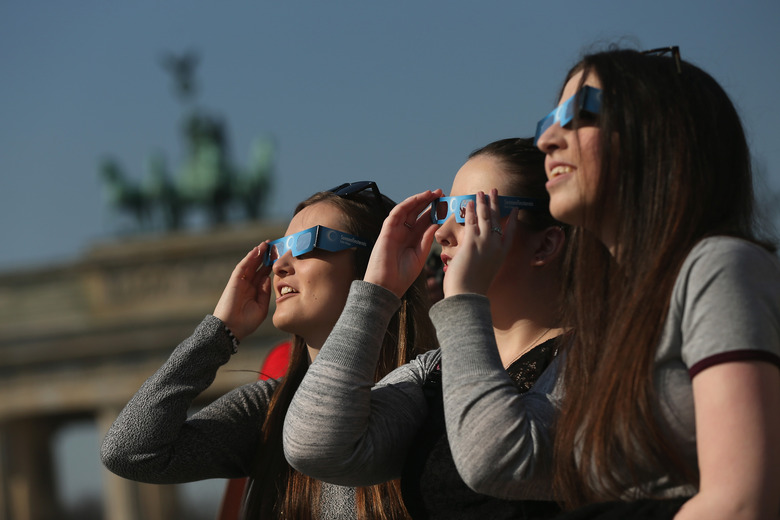Why Can't You Look At The Sun During A Solar Eclipse?
A total solar eclipse is one of the most awe-inspiring events in nature, but astronomers and ophthalmologists warn that looking at the sun without solar eclipse glasses or other protection can damage your eyes and cause permanent blindness.
Totality, the brief period when the moon completely covers the sun, is the only safe time to watch with the naked eye. Lasting from seconds to a maximum of 7.5 minutes, depending on circumstances, totality changes the daytime sky to deep twilight – but turn away as soon as the sun reappears because even the smallest sliver is dangerously bright.
The Hazards of Sunlight
The Hazards of Sunlight
The sun is basically a huge, continuous thermonuclear explosion, which produces intense radiation across the spectrum from infrared to ultraviolet light and beyond. Infrared light is absorbed by many materials and is readily converted to heat, while ultraviolet light is the source of sunburn.
Headaches and temporary distortion of vision are only the mildest effects from exposure to bright sunlight. According to the Cleveland Clinic, ultraviolet radiation can cause a number of eye disorders, including macular degeneration, solar retinitis and corneal dystrophies.
Moreover, the effects are cumulative, so looking at the sun twice results in two times the damage compared to looking at it once, even if viewed on different days.
The Danger of Eclipse Viewing
The Danger of Eclipse Viewing
Although people have a natural aversion to extremely bright light, the temptation to gaze at the sun during a solar eclipse can be overwhelming, leading to lapses of good judgement. The darkness that accompanies an eclipse can override the reflex to squint and avert sight, increasing the amount of intense light striking the retina and making eye damage more likely.
Because of its intensity, viewing even a small slice of the sun can be dangerous. The lens of the eye focuses and concentrates sunlight on the retina, scorching it and leading to solar retinopathy; because the retina has no pain receptors, you won't be aware of the damage until it's too late. For the same reason, don't watch an eclipse through unfiltered telescopes, binoculars or photographic lenses.
Eclipse Blindness Symptoms
Eclipse Blindness Symptoms
Solar eclipse eye damage symptoms include:
Reduced visual acuity
Central scotomas (blind spots),
Chromatopsia (disruption or tinting of color vision),
Metamorphosia (disruption or distortion of shape perception), and
Photophobia (light sensitivity)
If you have any of these symptoms, go to an eye doctor for examination and treatment.
Solar Eclipse Glasses
Solar Eclipse Glasses
If you want to watch a solar eclipse, use eye protection that filters the spectrum from infrared to ultraviolet. Conventional sunglasses, smoked glass or colored glass don't provide this level of protection. You can use welder's goggles of Shade 12 or higher. Even better, use solar eclipse glasses that are specially made for viewing the sun.
It is important to use only solar eclipse glasses that meet the requirements of international safety standard ISO 12312-2, "Filters for Direct Observation of the Sun." During the most recent eclipse of August 2017, many poor-quality eclipse glasses did not meet this standard and put unknowing users at risk of vision damage.
Make sure the lenses of your solar eclipse glasses are not torn, scratched or punctured. If the lenses are damaged or are coming loose from the frames, throw the glasses away.
Because their larger optics collect and concentrate much more light than the lens of the eye alone, do not look at the sun through unfiltered telescopes, binoculars or photographic lenses – eclipse glasses do not protect your sight in this situation.
A Pinhole Projector for Watching the Sun
A Pinhole Projector for Watching the Sun
From start to finish a solar eclipse lasts several hours and you can watch all phases safely with a projector made from two pieces of cardboard. Punch a pinhole in one board and face it toward the sun. Hold the second board directly behind the first and the pinhole will project the sun's image onto it.
Using this simple method you can witness a rare astronomical event while also protecting your sight.
References
- Cleveland Clinic: Your Eyes – Separating Fact from Fiction
- NASA: Ask an Expert – An 'Eclipse' is More Than a Movie
- Space.com: How to Safely Observe Sunday's Solar Eclipse
- Teton Eclipse Solar Blindness Symptoms and Treatment
- Eclipse 101
- Light and Infrared Radiation
- How to Tell If Your Eclipse Glasses or Handheld Solar Viewers Are Safe
Cite This Article
MLA
Deziel, Chris. "Why Can't You Look At The Sun During A Solar Eclipse?" sciencing.com, https://www.sciencing.com/cant-look-sun-during-solar-eclipse-3251/. 28 August 2019.
APA
Deziel, Chris. (2019, August 28). Why Can't You Look At The Sun During A Solar Eclipse?. sciencing.com. Retrieved from https://www.sciencing.com/cant-look-sun-during-solar-eclipse-3251/
Chicago
Deziel, Chris. Why Can't You Look At The Sun During A Solar Eclipse? last modified March 24, 2022. https://www.sciencing.com/cant-look-sun-during-solar-eclipse-3251/
